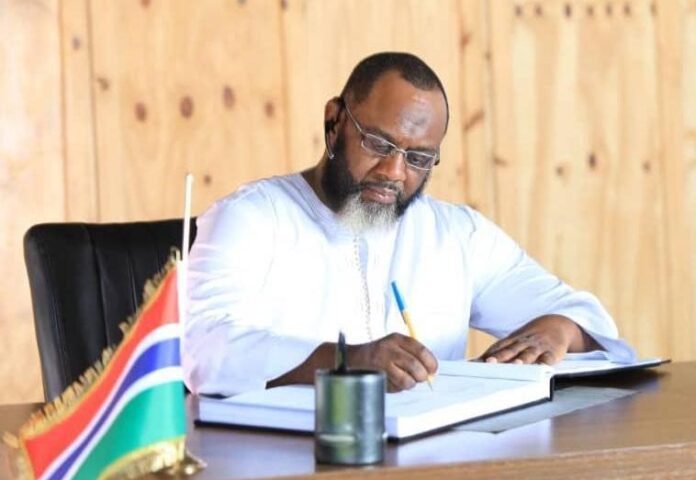As The Gambia approaches its Diamond Jubilee, it is a time for celebration, reflection, and renewed commitment to national development. Sixty years of independence is a significant milestone, yet the crucial question remains: what have we achieved as a nation? Have we lived up to the dreams of our forefathers who fought for self-rule, or have we fallen short?
While there have been undeniable strides in various sectors, our journey has also been marked by stagnation, mismanagement, and unfulfilled promises. Analyzing the three post-independence administrations—the governments of Sir Dawda Kairaba Jawara, Yahya Jammeh, and Adama Barrow—provides insight into the progress made, the setbacks endured, and the path forward.
Under the leadership of Sir Dawda Kairaba Jawara from 1965 to 1994, The Gambia laid the foundation for a stable and democratic society. His administration focused on institution-building, peace, and the rule of law. The health sector saw the establishment of hospitals and clinics across the country, although access to quality healthcare remained a challenge, especially in rural areas.
Education expanded with the construction of primary and secondary schools, though opportunities for higher education were limited, with most students traveling abroad for university studies. Agriculture, the backbone of the economy, relied heavily on groundnut production, but due to a lack of diversification and mechanization, the sector remained vulnerable to market fluctuations.
Sports received minimal attention, and as a result, Gambian athletes struggled to make a mark internationally. Corruption was relatively low during this era, but the government failed to take bold steps in industrialization and self-sufficiency, leaving the economy largely dependent on foreign aid. While patriotism remained strong among citizens, the government’s reluctance to modernize the country’s infrastructure and economy eventually contributed to its downfall.
Yahya Jammeh’s rise to power in 1994 was met with a mix of hope and skepticism. His administration made ambitious promises, some of which materialized while others led to widespread disappointment. The healthcare sector saw improvements with the expansion of medical facilities and free healthcare initiatives. However, Jammeh’s controversial claim of curing HIV/AIDS through herbal medicine brought international embarrassment and undermined scientific progress.
Education witnessed a major transformation with the establishment of the University of The Gambia in 1999, offering young Gambians the opportunity to pursue higher education at home. Yet, political interference in academic institutions and the suppression of intellectual freedom discouraged critical thinking. Agriculture was a top priority in his “Vision 2020” agenda, but the sector remained largely unproductive due to excessive government control and corruption.
While Gambian football gained international recognition, with the U-17 team winning the African Championship, other sports were neglected due to poor funding and management. Corruption became rampant under Jammeh, with state resources mismanaged and political opponents exiled or imprisoned. Patriotism suffered as fear and repression gripped the country, creating a deeply divided society where loyalty to the regime was often forced rather than genuine.
The transition to Adama Barrow’s administration in 2017 was a historic moment, with expectations for democratic restoration and national rebuilding. However, his government has struggled to implement the long-promised reforms. The health sector remains in crisis, with hospitals suffering from drug shortages, poor infrastructure, and underpaid medical personnel.
Despite increased school enrollments and the expansion of tertiary institutions, education quality remains a challenge, with many graduates facing unemployment due to the lack of practical job opportunities. Agriculture continues to lag, as the country remains heavily reliant on imported food despite the government’s rhetoric on self-sufficiency.
Sports development has seen mixed results, with the national football team making history at the Africa Cup of Nations, yet grassroots sports remain underfunded. Corruption has persisted despite initial promises of transparency, with scandals involving government contracts and public funds mismanagement surfacing over time. National unity has also suffered, as political polarization and lack of strong leadership have widened the divide among citizens.
Each of these administrations has made significant contributions to national development, but they have also made critical missteps that have hindered progress. A major failure across all three governments has been the inability to industrialize and modernize the economy, leaving The Gambia dependent on imports and foreign aid.
Another setback has been the failure to create a corruption-free government that prioritizes national interests over personal enrichment. Education and healthcare have seen improvements, but they have not been transformed into world-class systems that can compete regionally or internationally. The lack of investment in sports has denied many young talents the opportunity to excel on a global stage.
As The Gambia celebrates 60 years of independence, the focus should be on unity, accountability, and development. To move forward, strong institutions must be built, corruption must be eradicated, and a culture of patriotism must be instilled in all citizens.
The government must prioritize economic self-sufficiency by diversifying agriculture and investing in industrialization. Healthcare should be modernized, with improved facilities and better working conditions for medical professionals. Education should be reformed to align with job market needs, encouraging vocational and technical training alongside traditional academic learning.
Sports should be given adequate funding to nurture young talents and create opportunities for international competitiveness. Most importantly, citizens must embrace a renewed sense of nationalism, recognizing that development is a collective responsibility rather than a task solely for the government.
The Gambia’s Diamond Jubilee should not just be a time for celebrations; it should be a moment of introspection and commitment to a better future. The country has the potential to be a model of progress in Africa, but only if leaders and citizens alike take responsibility for its transformation. The next decades should not be about repeating past mistakes but about charting a new path toward a prosperous, united, and self-reliant nation.
Servant Musa Ousainou Yali Batchilly
Secretary General and Party Leader
Gambia Action Party (GAP)




